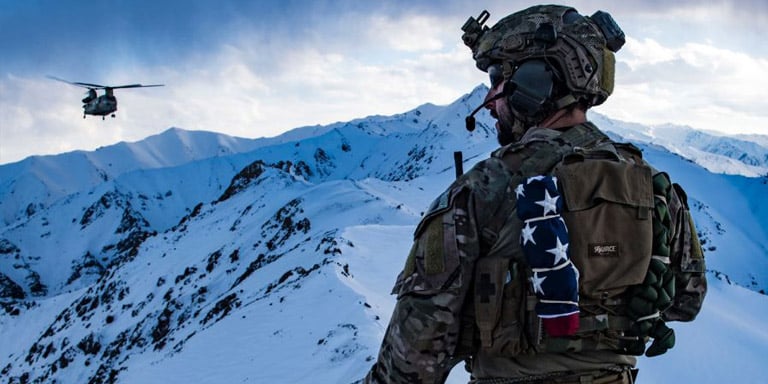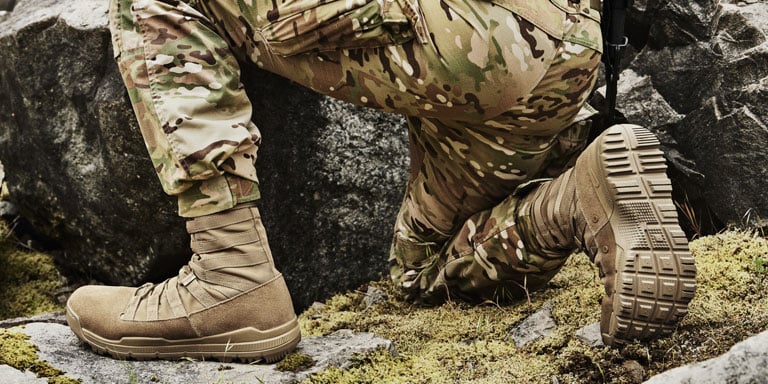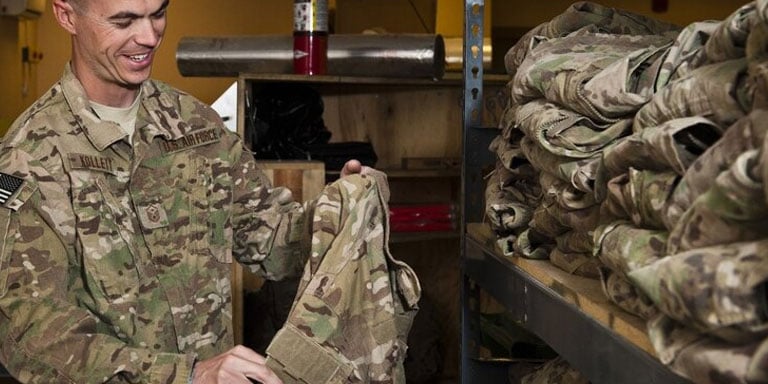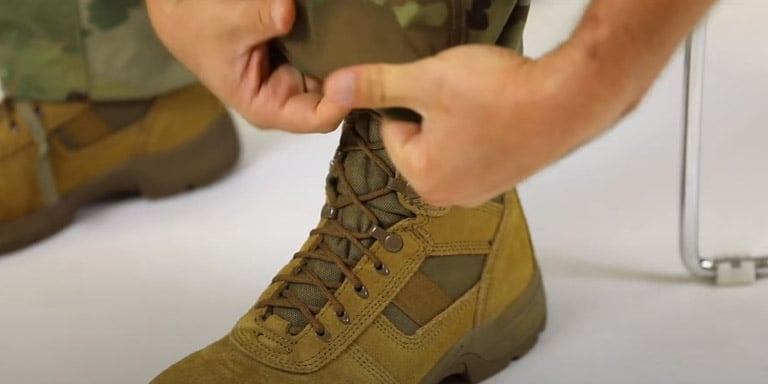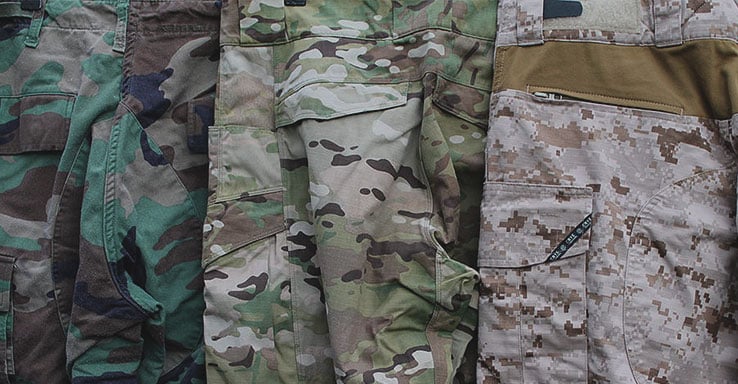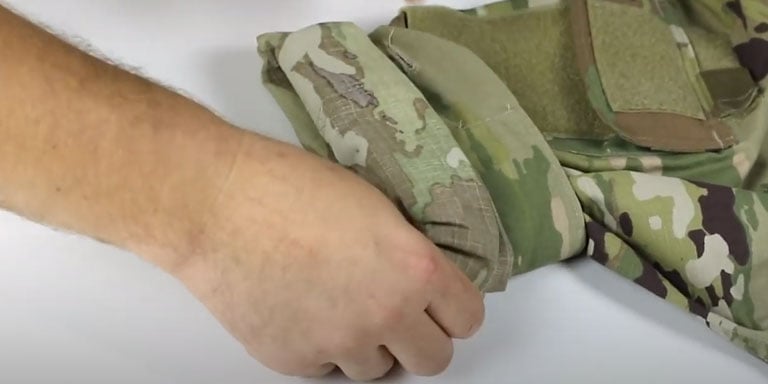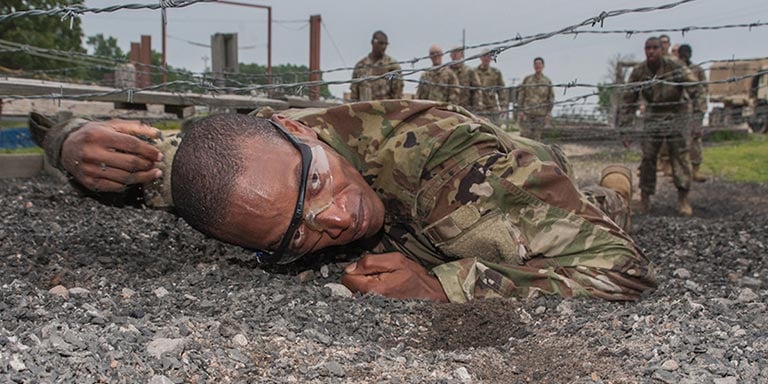
To serve in the U.S. Armed Forces, you must get through the infamous Basic Training. Being well prepared for Basic can help it go more smoothly for you in a myriad of ways. We'll help you get there by outlining what to expect, what to pack and how to prepare not only physically, but also mentally.
Prepare Your Finances

If you are entering the military immediately after high school, don't have any debt and are still living at home, this is probably not a major consideration for you. You can pretty much pack your stuff and go.
However, If you're married, have kids or anyone who depends on you for their welfare, this is critical. Even if you don't have dependents, do you have financial obligations such as school loans, credit card debt or car payments?
Do a careful review of any payments you may owe and ensure you're caught up. Once in Basic, it will be extremely difficult to take care of your finances. You'll lack time and access to a means of communication.
If possible, set up automatic payments to your creditor. Another method would be giving a person access to your checking account. Make sure this person is extremely trustworthy. If you elect to have someone to pay your bills, provide them with a list of who you owe, when the payment is due, how to pay it (mailed check, online, in person), and how much is to be paid. Some institutions will allow you to stop and then restart payments, but normally the interest will continue to accumulate.
Failure to manage your finances could seriously damage your credit score for a few years. Also, financial difficulties can negatively impact your ability to get a security clearance. If you don't have one, you should set up a checking account with a local bank and make sure you take the account number and routing number with you to Basic. Military pay is done via direct deposit.
Prepare your Family
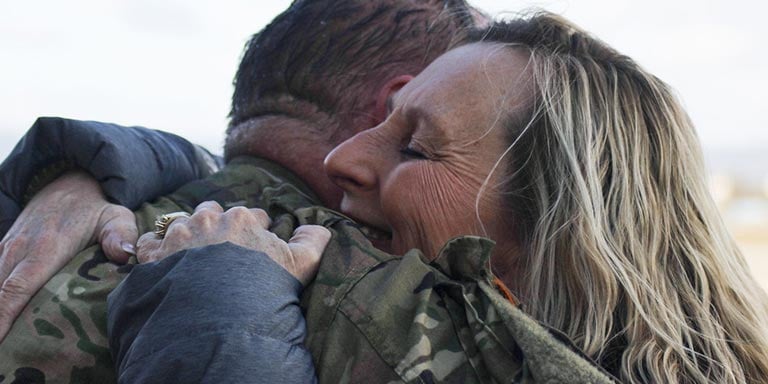
Make sure your family knows it will be very difficult for you to communicate with them while in Basic. Even if they manage to call to your orderly room, you will not be able to speak with them. Most installations will allow you to take a cell phone with you, but you will not be able to keep it on you. It's likely that the only time you'll be able to use it will be Sunday afternoons.
If your family experiences an emergency such as the death or serious illness of an immediate family member, the fastest way for them to get you home is for them to contact the Red Cross. The Red Cross will verify the emergency and contact your command. The command will arrange for you to have emergency leave and go home. It is very important to know that the military will only accept emergencies verified by the Red Cross. A tearful phone call to your command will not suffice.
What to Pack
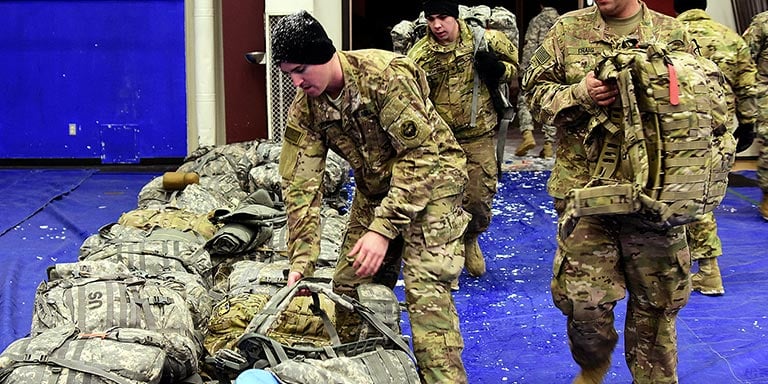
Clothing: You won't need much civilian clothing. Usually two or three days after you arrive, you will be issued the uniforms you will wear during training. You should bring a couple changes of underwear and socks for you to maintain your comfort and hygiene until you get your uniforms. The more you bring, the more you risk losing, having stolen or damaged. You'll want to leave expensive clothing at home. Shop Undergarments Shop Socks
Toiletries: Toiletries are essential because you can't get to the nearest store when you want to and the military will not provide them. You should arrive at Basic with an ample supply of shaving cream, soap, deodorant and shampoo. If they are a liquid or a gel, seal them in a Ziploc bag. A bottle of shampoo or shaving cream is the same size full or empty, so you might as well take a full one. Colognes and perfumes simply aren't necessary. The post / base exchanges (PX/BX) that you're allowed to shop at may not have your favorite stuff. When you get to talk with your family, you can have them send you more.
If you are going to Basic in the warmer months, an absorbent body powder is highly recommended. You are very active in Basic and will sweat a great deal. The powder will help prevent chafing and heat rashes. Because powders are extremely messy, you must be careful using them or you will have some very unhappy bunk mates. Check out powder sprays. They're easy to use and much neater than loose powder. Even cheaper and also highly effective is baby powder. After showering and drying, apply the powder.
Women need to pack an adequate amount of feminine products. Women with short hair might want to get it cut so that it meets military standards. If you wish to keep it long, it would be a good idea that you know how to quickly put it into a bun.
Food: You can take snacks such as cookies and chips, but you'll probably have to throw them away shortly after your arrival at your training center. Unlike toiletries, food sent from home, if not forbidden, is frowned upon. Part of your training regime is a controlled diet — three meals a day and no snacking.
Physical Preparation
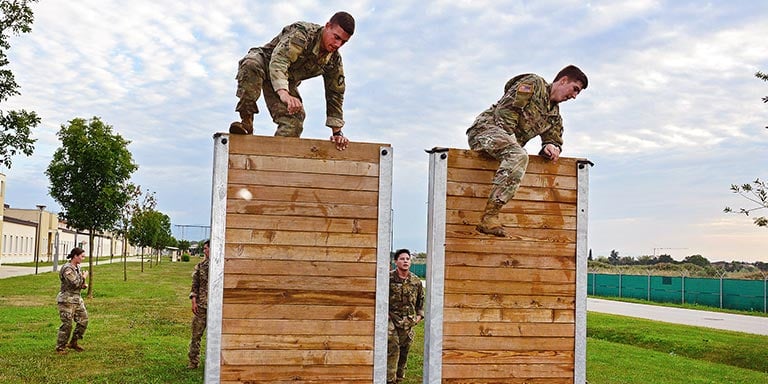
Unless you were a star athlete, Basic Training will probably be the most physically intense thing you ever do. If you go on the airborne, ranger, SEAL or other elite specialties, your level of physical fitness will match that of a professional athlete. And remember: all of them started with Basic Training just like you.
Smoking: Smoking is officially discouraged and not permitted in any U.S. government building in the world. If you want to smoke at Basic, you must go outside. You'll soon discover that finding time to support your habit is difficult. The same goes for other tobacco products.
Sleep: Sleep is a prized commodity. Basic Training days are long and start early. Prepare for Basic by becoming accustomed to no more than six hours of sleep. Unfortunately, you cannot store sleep, so don't short yourself by having a rollicking send off the night before you report to Basic. Do that and you will start off sleep deficient. Changing your sleep cycle in advance will allow you to be more awake during training and better able to learn the subject matter.
Weapons marksmanship: This can be difficult to practice but if you are a reader who has never fired a rifle and are concerned about it, try to relax. You will not be the only one in the bleachers who never fired a rifle and the military is completely prepared to train you. Don't let anyone kid you, service rifles will only have very small "kick," or recoil. Also, military ranges are extremely safe. NCOs patrol them continuously to keep accidents from happening. Depending on the location there will be a safety NCO for every three to five shooters.
Strength & Fitness: You don't need a gym membership or to own an expensive weight set to prepare for Basic. Even if you were to show up totally unprepared, eventually Basic Training will whip you into adequate physical condition. However, if you are living a sedentary lifestyle, your first bouts of physical training (PT) are going to hurt — a lot. If you get into a routine at home, your performance at Basic will be adequate from the beginning. You'll be able to enjoy your workouts and not struggle to complete them.
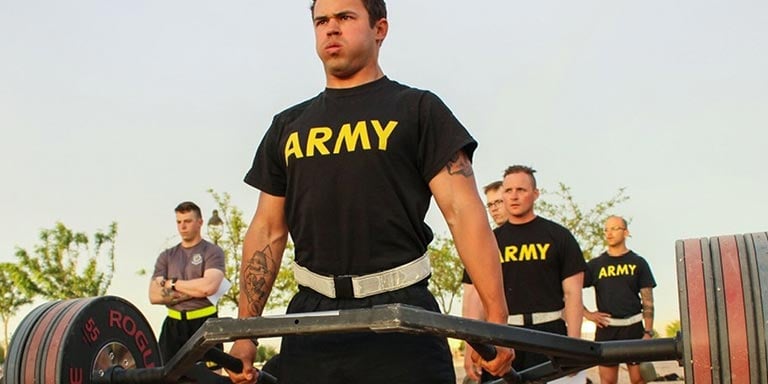
Fitness (or the lack thereof) is noticed by the training noncommissioned officers (NCOs). If you're not physically capable, you might find yourself in a group receiving extra training in order to improve your performance. This extra training is sure to bite into what would otherwise be your free time. If you don't obtain the physical abilities required, you can find yourself boarded out of the military, meaning you will be discharged and your military career will be over.
You'll need to develop upper body strength, especially the shoulder girdle. Basic Training makes great use of these muscles. Here, some 'dumb iron' (cast iron) weights can be helpful. At an absolute minimum do push-ups, lots of push-ups. A standard punishment for a minor infraction is often being "dropped" for 10 or 20 push-ups.
You'll also need to work on your body core, the area from your armpits to the top of your hips. One of the most common exercises for this is sit-ups. Another simple exercise to develop the core is dumbbell side bends. Hold a weight in a hand and bend the torso to the side opposite the weight. Return to the upright position and repeat. No weights? Grab a carton of milk. What you lack in weight, make up in repetitions. Plank exercise is good for the core and requires no equipment whatsoever, just a flat space the length of your body.
How much weight should you use? Start at an amount you can manage with little difficulty. When it becomes easy to manage that weight, get a heavier one. How many repetitions? Do the exercise until it is difficult and then stop. Do not strain yourself. A general rule of thumb is that heavier weights develop muscle, more reps improve endurance. If you're not used to working out, it's recommended that women should start with 10 pounds and men with 15. Too easy? Add 5 pounds. You need to exercise three times a week for at least two months prior to reporting to Basic to actually make improvements to your readiness. If you exercise for less than two months, you will probably not see much improvement.
One last tip: run! If you can only squeeze in so much time for exercise, spend it running! As with weights, you need to start 8 weeks in advance. Start easy. Haven't been exercising? Go out and see if you can jog a block. Easy? Two blocks. Then when that gets easy, add still more distance. Running works the largest muscles of your body: your legs, your lungs and your heart. Running also increases your overall endurance.
The following are Army minimum standards to be met immediately upon entry into Basic Training:
Females:
- Females (age 17-21): 13 push-ups, 47 sit-ups and a 2-mile run under 19 minutes, 42 seconds
- Females (age 22-26): 11 push-ups, 43 sit-ups and a 2-mile run under 20 minutes, 36 seconds
Males:
- Males (age 17-21): 35 push-ups, 47 sit-ups and a 2-mile run under 16 minutes, 36 seconds
- 17 Sit-ups in one minute
- Males (age 22-26): 31 push-ups, 43 sit-ups and a 2-mile run under 17 minutes, 30 seconds
The Navy uses a "forming standard" administered on the fifth day of boot camp:
Males:
- 1.5 mile run under 16:10
Females:
- 1.5 mile run under 18:37
Give yourself the tests. How did you do?
Mental Preparation
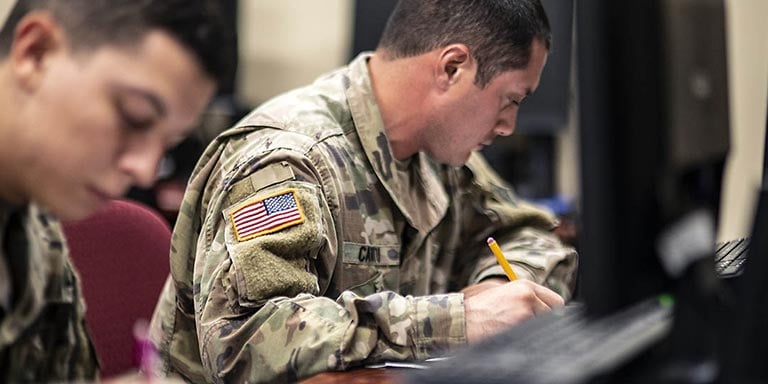
It never hurts to study before Basic. Visit the library and see what source materials they have concerning your branch's training. It would also be helpful to research drills and ceremonies like performing a right-face and an about-face and the commands used to move formations of people.
If you show up at Basic Training physically fit, well prepared and well rested, you already won the majority of the tasks of completing Basic Training. With these things out of the way, you now have a mental battle to meet. Basic Training is not a normal lifestyle. It has long, physically taxing days. People yell at you, they yell at the person beside you, they inflict punishment on you and they get you up early and put you outside in all types of weather. How do you cope?
For one: Keep your sense of humor. This does not mean laugh at the events around you but put them in a less threatening perspective. Basic Training is temporary! Everyone in Basic counts the weeks to graduation. It's a countdown to a return to a more rational world.
Realize it is deliberately difficult, but despite all the stress, tell yourself it's just not that bad. Whether you're 17 or 27, it's normal to miss your family. Take advantage of any opportunity to talk with them and get refreshed. No matter what you went through last week, they are still there waiting for you.
Every enlisted person in every branch of service completed some form of Basic Training. Some will try to tell you horror stories. No matter what they tell you, they did finish Basic Training. You will too. And for decades afterward you will recall events that happened to you and effortlessly remember the name of the sergeant who dominated you. Do your best, keep your sense of humor, and realize it will end eventually.
Did you find this article helpful?


